- Home
- Andrew Wareham
The Privateersman (A Poor Man at the Gate Series Book 1) Page 2
The Privateersman (A Poor Man at the Gate Series Book 1) Read online
Page 2
A tawny owl passed silently over his head, a rush of air its only indication, and a pair of screech owls talked to each other for a few minutes. Once he spotted a bat against the moon. Otherwise he was alone, but that was nothing new, he always had been. He could not remember his mother, she had died when he was two or three, and his father had always been a distant figure – not unkind, protective, making sure there was food on the table and clothes on his back, teaching him the ways of the fishing boats, and the associated trade, but never with much to say, almost never touching him. His father had found the pennies for dame school, had never begrudged them, had insisted that he went to school, in fact, and in one of their very few conversations had asked him if he wanted to go on to the Latin school in Bridport, the dame having said he was bright enough to be successful there; he had accepted his assurance that he would rather go to sea without comment either way. They had lived in their own small cottage, a little removed from the village, with their own short crescent of shingle where they drew the boat up, just far enough out to keep themselves to themselves and to make sure that his acquaintances from school never became close friends. It had the advantage that there was nothing to regret, no kin, no soul-mate to sever ties with; very little in the way of personal possessions either, nothing to cherish for sentiment – he could look forward, there was nothing behind him; he wondered if there would ever be anything in front.
For miles the road crossed the empty heaths before dropping down to the coastal clays, equally desolate at first, the soil unfriendly to farming except after a lot of labour and money had been put into drainage and dung and marl, but close to Poole and its market there was arable land, made fields with smallholdings and hamlets to work them. In the nature of things, the road would go through the middle of each cluster of houses, and that presented him with a gamble. If he kept to the road he might be stopped in any of the villages – strangers in the night were rare and unwelcome beings, especially close to a villainous set of townies, thieves and rascals to a man; if he moved out into the fields he might wake the dogs, might be chased down by suspicious farmers who would certainly hale him off to the constable for being on their land without reason. On the road he might be able to claim that he was a bona fide traveller, a seaman, say, from Wimborne, who had dallied over-long at home or with his girl and had to make the morning tide; in the fields he had to be a poacher at best. If the hue and cry was up for him then he was lost, but if there was no alert out then he might be able to talk his way through a village.
In the event he was not stopped at all; he walked the road and was ignored, if he was ever seen. The constables remained tucked up warm in their beds and the busybodies occupied themselves elsewhere while the watchdogs were used to foot-traffic on the road and would only raise the alarm for those who strayed off the carriageway.
Soon after dawn he was in Poole, ambling down the High Street to the quayside, lost in the early-morning bustle of the waking working day. He found a pie-shop as it opened, joined a dozen other men grabbing a hot breakfast.
‘Rabbit pie’, so the board said, ‘hot for d1’.
It was hot and it cost a penny, so the shopkeeper wasn’t a complete liar, but it tasted unlike any rabbit he had ever eaten.
“Rabbit, mister?”
“Well, what do you expect for a bloody penny? There’s a bit of ‘orse in it. About fifty-fifty, I suppose.”
“Yeah, one ‘orse, one rabbit!”
It was edible and he was hungry; he finished it and wandered off, down to the waterfront to see what was about.
The town was old and rich and the port was bustling, the harbour full of coasters and small merchantmen and one big whaler, immediately identifiable by the basket crow’s nest. Nothing else bigger than two hundred tons, he estimated, most much less, typical local traffic. A dozen or so of fishing smacks, the larger drifters who would follow the herring run all the way from Newcastle to Penzance, selling at each port along the whole coast; they would work the mackerel off the West Country and then make their way back north before the worst of the winter storms set in; good money, but six or seven months out at a time. A few smaller boats, mostly local crabbers, not many in Poole, they were mostly working out of the local fishing villages, had probably come in to market. Three schooners and a lugger that looked a little too prosperous for working boats, well-kept and smart; smugglers for sure, working out of the Jersey entrepot, bringing in wines for the gentry and thus untouchable by the excise men, their bribes paid at the highest level and willing to be seen in daylight. One brig, somewhat larger than most, pierced for five or six guns on the broadside; not smart enough for navy and too few men in sight; too big to be a Revenue cutter, and probably too slow as well; a trader to Africa, maybe, or a Levanter, needing to defend herself against the Barbary pirates; being Poole, she might well be a private ship of war. Worth thinking about if he couldn’t get out any other way, there was money to be made on the privateers, but they were poorly regarded, generally speaking, too willing to turn to slaving in peacetime, and slaving was low. Besides that, there were always rumours about privateers – inconvenient prisoners, such as crewmen and poor passengers who could not pay a ransom, knocked over the head and thrown overboard, worse happening first to the females amongst them, that was always said; of some private men of war the accusation was made of downright piracy – they were said to take English ships into French ports, French ships into English. It was all possible, even likely, which was why generally speaking fisher folk did not go into privateers, or if they did, never came back to the nets again.
The quayside was lined, alternately it seemed, with boozers and ships’ chandlers – Poole was famous for its drinking houses, there were said to be ninety two along the mile of the High Street alone – Saturday night was famous for its drunken rioting. Not so many years back a drunken mob had hanged every Excise man in town outside their own office – though that was regarded as excessive, a one-off jollification which had not been repeated, the redcoats had been sent in afterwards and had been more than usually brutal. The pubs acted as meeting houses and often as ships’ agents, places where crew could sign on or passengers find a cabin; it was just a question of finding the right one. He looked up and down the whole quay before determining on the Horseshoes Inn because it was older, bigger, stone-built, respectable-seeming, likely to deal with a better class of mariner, perhaps. He sat and waited for a couple of hours, until the sun was higher – the drinkers of early morning would have no interest in business, would have nothing useful to say; anyone who needed to drink his breakfast was unlikely to be a successful, prosperous, honest sailor.
He did his best to spruce himself up, splashed water on his face and hands and smoothed his hair down, trying to look within reason respectable himself, then walked into the bar and took a pint of mild, the cheapest and weakest of beers. A quick pull at his mug and he asked the potman how he would go about buying a passage out of Poole; he wanted to go to the Americas, he said, and understood he needed to take passage on a Bristolman.
“Or from Cork, young master. You won’t be wanting to go up to London, to pick up a cabin there, so the easiest way be to take a coasting ship to Bristol or to the Cove of Cork. There’s three Bristolmen in that I know of the while, but whether they be bound east or west, I can’t say, off hand, like, young sir. I could find out for thee easy enough, sir. Will you be staying here, overnight, sir? A dinner and a bed and bite to eat in the morning, sir, your own room, all for eighteen pence, sir.”
He had to sleep somewhere, did not want to rough it in a back alley – a room made sense.
“Yes, please, I’d not thought of having to stay a night, but that makes good sense.”
“Yes, sir. What be the name, sir?”
“Andrews, Thomas Andrews.”
As he said it he realised that he should not have given his own real name, he should have invented one, but it was too late now, and he would be gone tomorrow.
“If so be you’re wi
shful to go to the Americas, Mr Andrews, you’ll be wanting some clothes for the voyage, I should reckon.”
“I suppose I will – I can get them this morning.”
“Would thee like to pay for the room, up front, like, sir?”
Tom dug into his pocket, took out his leather drawstring purse, pulled out silver for the room, putting gold back, not awake to the bartender’s eyes making a rapid valuation of the contents.
“Thank’ee, sir. If you be wishful, you can pick up warm clothes and a bag and necessities in the shops along the High Street, sir.”
Tom thanked him for his help and obediently went out to make his purchases – a heavy leather valise and working shirts, canvas trousers, thick socks and a warm woolly jumper, a waterproof jacket to go over all; he decided to buy boots as well, found a pair that fitted quite comfortably and would provide him with something to wear on land. A little thought saw him invest in two pairs of flannel drawers to wear week and week about, and then a length of towelling and a bar of soap. Equipped for all of his needs, he took his new kit back to the Horseshoes Inn and stowed it away in the small back room that was his for the night. He ate an early dinner of mutton and greens and new potatoes followed by a big plateful of summer pudding, the strawberries a rare treat. He wandered back down to the quay to look at the sights and ease his digestion, idling in the sunshine. He passed several unaccompanied young ladies, which was unusual in his limited experience; two of them asked him if he would like a good time but he smiled politely and said he was enjoying himself already, thank you.
The barman greeted him in the friendliest fashion when he came back to the Inn and drew a pint for him, on the house.
“The Swallow lugger be sailing on the morning’s tide, Mr Andrews, bound for Plymouth and Bristol, and there’s an empty cabin that’s yours for five bob, sir, if you takes your own grub along, ten bob if you eats at the master’s table. The master’ll be in later on, sir, and I’ll take you over to ‘im if you wants.”
“Yes, please, that would be very good of you. I’m much obliged to you.” Tom could see that he would need to give the man a tip as a thank you, wondered anxiously just what the right amount would be.
Tom leant on the bar and chatted idly for the next couple of hours – it was not busy in the early evening, it seemed. After three pints he found the need to ease his bladder and ambled out into the back yard at the barman’s instructions, found the appropriate wall by its smell; he was just adjusting his clothing when a wooden club caught him firmly above the right ear and dropped him neatly to the cobblestones, unconscious but not severely hurt, a very tidy, professional job.
Book One: A Poor Man
at the Gate Series
Chapter Two
His head hurt; it throbbed; when he felt very gently behind his ear it was tender.
“Some bastard hit me!” The sound of his voice gave him a headache; he closed his eyes again. It put the seal on a bad week, he felt, the whole world was against him, was creeping up behind his back.
Reluctantly, he decided he should make some effort to find out what had happened, discover the worst, whatever it might be – if he was in prison he might as well know at once, and start to prepare his mind for a fairly rapid hanging.
It wasn’t as bad as it might have been – he was lying on a wooden floor, not stone, and there was a thin palliasse underneath him and a rough woollen blanket drawn up to his chin. Some effort had been made to look after him, but he wasn’t in the room he had taken in the Horseshoes Inn.
He was wearing his new clothes, and the boots he had bought the previous day; knowing it must be a waste of time, he checked his pockets. No purse. Thirty guineas up the spout – six months and a dozen runs it had taken to put that much together, saving every penny his dad had given him, spending nothing, risking his neck, all for some thieving bugger to grab and piss up against the wall! A hundred and he had been going to buy his own boat, then he could have gone out with his dad seining rather than drifting, more than doubling their catch, with a bit of luck. He swore, then shrugged, at least he was alive and what he had made once he could do a second time, easier for knowing a bit more about the way the world worked now; in any case, he wouldn’t ever be going out with dad again and it didn’t seem likely he would be doing much fishing for a while yet. He stood up and stumbled as the floor pitched.
It was a deck, he was at sea, shanghaied.
Not the navy – if a press gang had taken him and somehow got him on board a man of war then he would be waking up in a crowded mess-deck, not on his own in a cabin or store-room like this. He sat down again to think.
He had to get out of England, that was given, and he had to stay away for a year or two, until the hue and cry had died down; when he came back it must not be to the fishing in Dorset, and it might be better not to come back at all. He had no money now, could not buy a passage out, so he had to sign on as a seaman, as a forecastle hand, which had always been on the cards; he was on a ship already, one that had taken some pains to get him on board and was hardly likely simply to let him go again. Wiser to make the best of it – he’d got some of what he wanted. He just hoped it wasn’t the whaler – a three year run to the Great South Sea by way of Cape Horn was not the way out he would have chosen, though he would be a thorough-going deep sea sailor by the end of it.
The door cracked open – he had not bothered to try the handle, it had to be locked and they weren’t about to forget him and leave him to starve, nor would they leave him long in idleness.
A cautious voice called in to him.
“You awake?”
“Yep.”
“You want to come out, then?”
“On me way.”
He walked slowly out of the small cabin, hands showing clear and empty – no knife or bottle or billy - glanced about him. He was below decks, had been kept in a bos’n’s store by the looks of things, hard up in the bows, a paint room, maybe; possibly purser’s lazaretto, but neither should have been empty, leaving harbour. He could just see a figure in the half light, pointing him to a ladder.
He blinked in the sunlight, his head complaining at the brightness; he wondered if this one was the bloke who had hit him, decided to let it wait – he would find out in time and he wasn’t too concerned anyway, what was a thump on the head after all that had happened already this week?
He was on the brig, and a dirty, scruffy, ill-cared for vessel it was! Eight small cannon and two empty ports on each side, there should be twelve all told. Four pound, he estimated. A chaser in the bows, roundshot in the ready-use rack about the size of an orange, probably six pounds. Not navy, as dirty as this. Not a merchantman, they carried stern-chasers for defence, had no use for a great gun in the bows. Not a smuggler – they ran, would fight only as a very last resort, never carried broadside guns which would condemn them as pirates. Must be a privateer, and an unlucky one, at that; profitable private ships turned would-be crewmen away, never had to resort to force to make up their numbers.
He looked more openly about him as his eyes became accustomed to the light. There was a watch of fifteen or sixteen men, which suggested a crew of about forty when he would have expected the better part of a hundred, privateers needing boarders and prize crews.
Stood six feet away, out of arm’s reach, was a lean, medium-tall, hard-looking seaman, a man who knew what he was doing. He was unarmed, so he thought he had no need for any weapon; best to take him at his own price, assume that he did know just what he was doing. He was dark-haired, swarthy, brown-eyed, hook-nosed, looked more like a Spaniard or a Romany than a local Englishman, Tom thought.
“Captain wants to speak to you. What’s your name?”
“Tom Andrews.”
“I’m Jack Smith, prize master, Star of the Avon. Captain’s name is Blaine, by the wheel. You coming?”
“Yes, sir.”
Smith – if that was the name he wanted – relaxed, turned his back and led Tom aft, happy he would not be attacked from
behind, not by a man who had just called him sir – he would have had other names for him if he was after blood.
“New man, Captain. Name is Tom Andrews.”
The captain nodded and coughed and sniffed; he stank of gin, explaining, perhaps, the state of the Star. He was skeletally thin, undernourished, the bottle probably his only sustenance, far gone; he was watery-eyed, fair hair uncut and thinning, blowing wildly in the light wind. Tall but stooped, Blaine would have been much the same height as Tom, looked over his shoulder, never into his face.
“How old are you, Andrews? You look big enough to do a man’s work.”
“Sixteen, sir. Last month.”
“Still got some height to make, and a lot of muscle to bulk out – you will be a big fellow before you’re finished! By the way you stand you have used the sea, Andrews?”
“Yes, sir. My dad had a drifter, a thirty footer. I crewed with him since I could walk, just about.”
“Good. You’re here now and you can make a choice – gun crew or boarder, whichever you wish. Ordinary seaman, not a landsman, so that will make you a one-and-a-half share man. If you show you’re good enough we’ll change that to ‘able’ and two shares. You don’t have to sign on, of course – if you want you can always swim back to Poole.”
Tom smiled at his wit – captains always had to be humourists. He had already seen that there was no land in sight, that they were well out into the Channel. He raised his hand, politely.

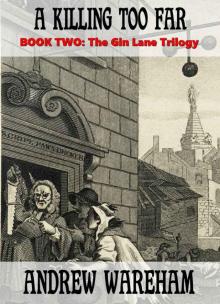 A Killing Too Far
A Killing Too Far Killing's Reward
Killing's Reward A New Place
A New Place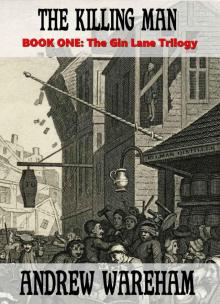 The Killing Man
The Killing Man Bold and Blooded
Bold and Blooded The Breaking Storm (Innocent No More Series, Book 2)
The Breaking Storm (Innocent No More Series, Book 2) Nobody’s Child
Nobody’s Child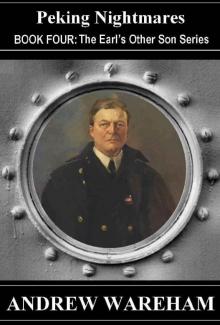 04 Peking Nightmares (The Earl’s Other Son Series, #4)
04 Peking Nightmares (The Earl’s Other Son Series, #4) Red Man
Red Man Foreign Mud
Foreign Mud The Gathering Clouds (Innocent No More Series, Book 1)
The Gathering Clouds (Innocent No More Series, Book 1) 06 A Soldier’s Farewell (Man of Conflict #6)
06 A Soldier’s Farewell (Man of Conflict #6) Chinese Whispers
Chinese Whispers 02 Shanghai Dreams (The Earl’s Other Son #2)
02 Shanghai Dreams (The Earl’s Other Son #2) Hungry Harry: An Orphan in the Ranks
Hungry Harry: An Orphan in the Ranks A Wretched Victory (Innocents At War Series, Book 6)
A Wretched Victory (Innocents At War Series, Book 6) Illusions Of Change (A Poor Man at the Gate Series Book 6)
Illusions Of Change (A Poor Man at the Gate Series Book 6) The Wages Of Virtue (A Poor Man at the Gate Series, Book 8)
The Wages Of Virtue (A Poor Man at the Gate Series, Book 8) Blood and Famine (Man of Conflict Series, Book 4)
Blood and Famine (Man of Conflict Series, Book 4) The Friendly Sea (The Duty and Destiny Series, Book 1)
The Friendly Sea (The Duty and Destiny Series, Book 1) Bursting Balloons (Innocents At War Series, Book 5)
Bursting Balloons (Innocents At War Series, Book 5) The Death of Hope
The Death of Hope Deadly Shores (The Duty and Destiny Series, Book 11)
Deadly Shores (The Duty and Destiny Series, Book 11) The Vice Of Virtue (A Poor Man At The Gate Series Book 10)
The Vice Of Virtue (A Poor Man At The Gate Series Book 10) Virtue’s Reward (A Poor Man at the Gate Series, Book 11)
Virtue’s Reward (A Poor Man at the Gate Series, Book 11) A Deadly Caper (Innocents At War Series, Book 2)
A Deadly Caper (Innocents At War Series, Book 2)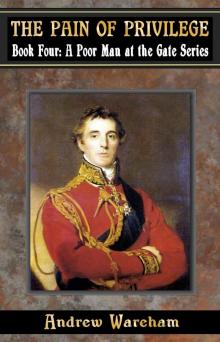 The Pain Of Privilege (A Poor Man at the Gate Series Book 4)
The Pain Of Privilege (A Poor Man at the Gate Series Book 4) Far Foreign (The Duty and Destiny Series, Book 9)
Far Foreign (The Duty and Destiny Series, Book 9)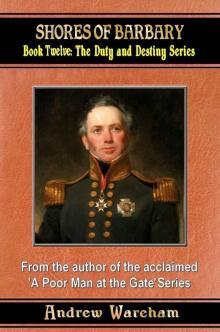 Shores of Barbary (The Duty and Destiny Series, Book 12)
Shores of Barbary (The Duty and Destiny Series, Book 12)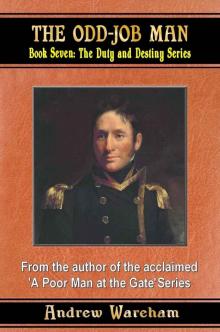 The Odd-Job Man (The Duty and Destiny Series, Book 7)
The Odd-Job Man (The Duty and Destiny Series, Book 7) Fire and Folly (Man of Conflict Series Book 3)
Fire and Folly (Man of Conflict Series Book 3) A Victorian Gent (The Making of a Man Series, Book 1)
A Victorian Gent (The Making of a Man Series, Book 1)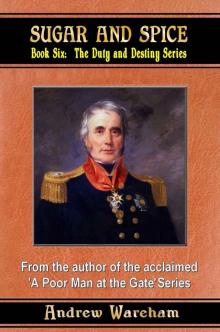 Sugar and Spice (The Duty and Destiny Series, Book 6)
Sugar and Spice (The Duty and Destiny Series, Book 6) Dark Days Of Summer (Innocents At War Series, Book 4)
Dark Days Of Summer (Innocents At War Series, Book 4) Dire Shenanigans (The Making of a Man Series, Book 2)
Dire Shenanigans (The Making of a Man Series, Book 2) The Fuzzy-Wuzzy Man (The Duty and Destiny Series, Book 3)
The Fuzzy-Wuzzy Man (The Duty and Destiny Series, Book 3) Privilege Preserved (A Poor Man at the Gate Series Book 5)
Privilege Preserved (A Poor Man at the Gate Series Book 5)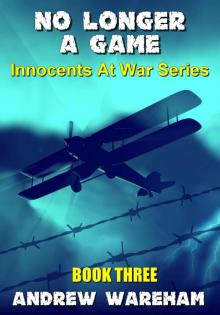 No Longer A Game (Innocents At War Series, Book 3)
No Longer A Game (Innocents At War Series, Book 3)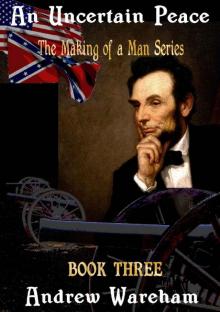 An Uncertain Peace (The Making of a Man Series, Book 3)
An Uncertain Peace (The Making of a Man Series, Book 3) Fortune And Glory (The Duty and Destiny Series, Book 5)
Fortune And Glory (The Duty and Destiny Series, Book 5) The Old Order (A Poor Man at the Gate Series Book 7)
The Old Order (A Poor Man at the Gate Series Book 7) A Place Called Home (Cannibal Country Trilogy, Book 2)
A Place Called Home (Cannibal Country Trilogy, Book 2) Nouveau Riche (A Poor Man at the Gate Series, Book 2)
Nouveau Riche (A Poor Man at the Gate Series, Book 2) The Privateersman (A Poor Man at the Gate Series Book 1)
The Privateersman (A Poor Man at the Gate Series Book 1) Britannia’s Son (The Duty and Destiny Series, Book 4)
Britannia’s Son (The Duty and Destiny Series, Book 4) Long Way Place (Cannibal Country Trilogy, Book 1)
Long Way Place (Cannibal Country Trilogy, Book 1) Spanish Tricks (Man of Conflict Series, Book 5)
Spanish Tricks (Man of Conflict Series, Book 5) A Parade Of Virtue (A Poor Man At The Gate Series Book 9)
A Parade Of Virtue (A Poor Man At The Gate Series Book 9) A Busy Season (The Duty and Destiny Series, Book 8)
A Busy Season (The Duty and Destiny Series, Book 8) Billy Bacon and the Soldier Slaves (Colonial Warrior Series, Book 1)
Billy Bacon and the Soldier Slaves (Colonial Warrior Series, Book 1) Raging Rajahs (Man of Conflict Series, Book 2)
Raging Rajahs (Man of Conflict Series, Book 2) Victorian Dawn (A Poor Man at the Gate Series, Book 12)
Victorian Dawn (A Poor Man at the Gate Series, Book 12) Born To Privilege (A Poor Man at the Gate Series Book 3)
Born To Privilege (A Poor Man at the Gate Series Book 3)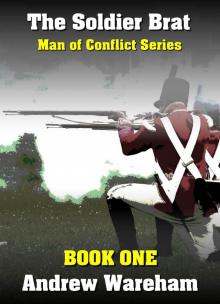 The Soldier Brat (Man of Conflict Series, Book 1)
The Soldier Brat (Man of Conflict Series, Book 1)